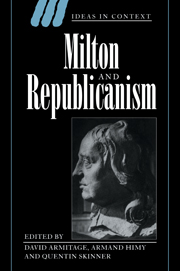Book contents
- Frontmatter
- Contents
- Notes on contributors
- Preface
- PART I DEFINING MILTON'S REPUBLICANISM
- PART II MILTON AND REPUBLICAN LITERARY STRATEGY
- PART III MILTON AND THE REPUBLICAN EXPERIENCE
- PART IV MILTON AND THE REPUBLICAN TRADITION
- 12 The Whig Milton, 1667–1700
- 13 Borrowed language: Milton, Jefferson, Mirabeau
- Index
- Recent titles in the series include
13 - Borrowed language: Milton, Jefferson, Mirabeau
Published online by Cambridge University Press: 27 October 2009
- Frontmatter
- Contents
- Notes on contributors
- Preface
- PART I DEFINING MILTON'S REPUBLICANISM
- PART II MILTON AND REPUBLICAN LITERARY STRATEGY
- PART III MILTON AND THE REPUBLICAN EXPERIENCE
- PART IV MILTON AND THE REPUBLICAN TRADITION
- 12 The Whig Milton, 1667–1700
- 13 Borrowed language: Milton, Jefferson, Mirabeau
- Index
- Recent titles in the series include
Summary
Is there something un-English about republicanism? A glance at the standard student textbooks on political science might seem to suggest so. The index to L.J. MacFarlane's Modern Political Theory (1970) contains no entry for ‘republicanism’. Neither does Rodney Barker's Political Ideas in Modern Britain (1977). An Open University reader on Politics and Ideology (1986), sympathetic as it is to anti-establishment causes, finds no room for the topic. Even a professed anti-monarchist like Tom Nairn sees no role for republican ideas in his vision of The Break-Up of Britain (1977). To the English ear, at least, the word suggests either Bush and Reagan or, more vaguely, Ireland – something alien and disagreeable to do with the Provisional IRA. English republicans there have been, to be sure, some distinguished and courageous; but it is hard to resist the inference that as an active political cause, English republicanism died on the scaffold with Algernon Sidney, and was buried, in an unmarked grave, by the settlement of 1689.
Such, at any rate, is the implication of Zera Fink's account of the ‘classical republicans’. But Fink's title reminds us that, as ever, there is a problem with the word. His republicans were ‘classical’ in two senses: that their conceptions of the ideal polity, the res publica, were derived from Plato and Cicero, Thucydides and Livy; and that they had a programmatic clarity and coherence not often found in English political thinking. His attempt to demonstrate just such a purposeful and principled consistency running from Of Reformation through the Tenure of Kings and Magistrates to the Readie and Easie Way is resourceful.
- Type
- Chapter
- Information
- Milton and Republicanism , pp. 254 - 271Publisher: Cambridge University PressPrint publication year: 1995
- 6
- Cited by



